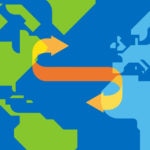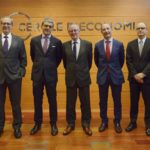"The United States and Europe, united, are much stronger"
Europe and the U.S. need to promote global trade and services standards. And to do this, they must keep relying on multilateral agreements, which set out a strategic position with respect to third parties from a commercial, economic and political point of view. "The United States and Europe, united, are much stronger," said José Manuel González-Páramo, Executive Member of the Board, Head of Global Economics, Regulation and Public Affairs at BBVA, in Barcelona on Monday.

Both blocs share major commercial ties, but also common values such as freedom, democracy, respect for human rights and the defense of privacy, the BBVA director recalled in the seminar '100 years of AmChamSpain: transatlantic relations and their future.'
Europe and the USA: The global economic and trade axis
During his speech, he noted how the transatlantic economy is the world’s largest market. Together, the EU and the US account for about 33% of the world’s GDP and 28% of its exports. They are also each other’s main source and destination of foreign direct investment. And they comprise the globe’s largest trading zone, with commercial sales totaling nearly $5.5 trillion every year.
But the pace of global change keeps picking up: on the one hand, Brexit' and Donald Trump’s election as president of the United States, and on the other, the emergence of the Asia-Pacific region. Therefore, renegotiating the trade agreement between the two blocs (TTIP) would be "fantastic to strengthen this relationship," said González-Páramo.
And, in this context, Europe remains a strong advocate of free trade, as the EU economy depends to a large extent on world trade. Almost 40% of EU exports are covered by free trade agreements. And that is why the EU recently concluded agreements with countries such as South Korea, Canada and Japan, and is working to shortly do the same with Mexico (update of the one signed in 2000) and Mercosur. Additionally, the EU is currently in talks to start negotiating deals with New Zealand and Australia.

José Manuel González-Páramo, Head of Global Economics, Regulation and Public Affairs at BBVA - AmChamSpain
Europe and the US: transatlantic relations in the new digital era
The flow of data between the United States and Europe is, by far, the highest in the world and 50% higher than, for instance, between the United States and Asia in absolute terms.
Defining a model that can be applied to the rest of the world and equalizing global data transfer conditions is beneficial to the US and EU’s common interests"
In González-Páramo’s opinion, the trade model enabled by the digital revolution will require new rules. "Cross-border" services and regulations, such as rules and intellectual property rights, are the main problems facing the digital economy. Governments and regulators on both sides of the Atlantic need to work to establish agreements that safeguard data transfers - similar to the 'Privacy Shield'. In this sense, Páramo considers that "defining a model that can be applied to the rest of the world and equalizing global data transfer conditions is beneficial to the US and EU’s common interests."
Another positive step is the 'Transatlantic Fiber Cable', known as Marea: a 6,600 km (4,101 mi) long super-fast underwater data cable, launched in June 2016 and connecting Virginia Beach (Virginia, USA) and Sopelana (Bilbao, Spain).
Trade policy of the US Administration
On the other hand, the speakers shared their insights into the protectionist shift of the United States. If during the Obama administration, between 2009 and 2016, 13% of the world’s restrictive measures came from the U.S., the percentage rose to 21% in 2017, with Trump already in office. In 2018, in the year-to-March, the U.S. accounts for 44% of the total of the restrictive measures passed across the world.
It is evident that the most recent measures could very well spark a commercial war,"
"It is evident that the most recent measures could very well spark a commercial war," said González-Páramo. In his view, it is "paradoxical" that this would take place during a highly expansive and calm phase of the financial market cycle.
José Manuel González-Páramo shared a round table with Josep Piqué, former Minister of Foreign Affairs of Spain and chairman of the Ibero-American Foundation; Daniel Carreño, President and Chairman of General Electric Spain & Portugal and vice-chairman of AmChamSpain; Jaime Malet, chairman of AmChamSpain; and Thomas Reott, counselor for economic affairs of the U.S. Embassy in Spain.
To commemorate its centennial and in collaboration with Círculo de Economía, AmChamSpain organized this seminar to analyze the first year of Donald Trump’s presidency, as well as investment opportunities between Spain and the United States.
In December 2016, José Manuel González-Páramo was elected to serve a two-year term as European Chair of the TransAtlantic Business Council (TABC), the official consultation body between the governments of the United States of America and the European Union on trade, investment and regulatory matters.

José Manuel González-Páramo (BBVA), with Jaime Malet, chairman of AmChamSpain; Josep Piqué, former Minister of Foreign Affairs of Spain and chairman of the Ibero-American Foundation; Daniel Carreño, President and Chairman of General Electric Spain & Portugal and vice-chairman of AmChamSpain; and Thomas Reott, counselor for economic affairs of the U.S. Embassy in Spain. - AmChamSpain